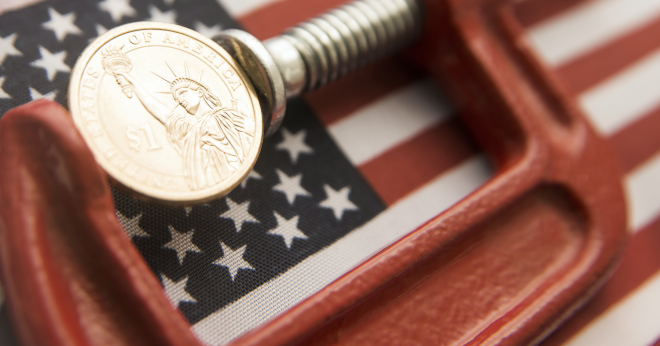Brian Forde most recently ran for U.S. Congress in California’s 45th district and was the founding Director of the Digital Currency Initiative at MIT. Previously, he was a Senior Tech Advisor in the Obama White House.
On the eve of the most important election of our time, we’ve seen what misinformation gets us. Fear of the unknown, fear of change. In these times, we need to be vigilant about how we examine what’s new or different.
Hundreds of articles have been written about campaign contributions made with cryptocurrencies — and all too often they get it wrong. Many of these articles are riddled with factual errors, but more distressingly engender fear of something new based on a deep misunderstanding.
I know because, during my recent run for Congress, approximately $300,000 of my campaign contributions were donated in cryptocurrency.
I wasn’t a fringe candidate who rails against the government. I was a Senior Tech Advisor in President Obama’s White House who wrote the White House memo on Bitcoin and briefed the president on the technology.
After leaving the White House, I started the research lab on cryptocurrencies at MIT to help the world better understand this emerging technology and its global impact – and that’s what I seek to do in this article.
Here are some of the biggest misconceptions:
- First, it’s important to understand the scope of campaign contributions made with cryptocurrencies. One article claimed that U.S. Congressional candidates have raised $550,000 in cryptocurrencies since 2014. To put that figure in perspective, the amount is equal to 0.032 percent of the more than $1.7 billion that’s been raised by candidates since the 2014 election cycle.While the amount donated in cryptocurrency is a fraction of one-tenth of a percent of total contributions, the author claims that the scope and threat are large because virtual currencies are used by more than 3 billion people. No, nearly 40 percent of the world’s population does not use cryptocurrencies.The words virtual currencies, virtual money and cryptocurrencies are incorrectly used interchangeably. As a result, we end up with wildly inaccurate information being given in U.S. Congressional hearings and parroted in articles.Virtual currencies are the most expansive name and include products such as airline miles and Starbucks cards. Star Alliance points are not a threat to the integrity of our elections, nor are cryptocurrency users who likely number in the tens of millions.
- Second, some claim cryptocurrencies have been linked to illicit activities including money laundering, without qualifying that the same is true of cash and credit cards. The UK government ranked ways that money was being laundered. Banks were number one and bitcoin was at the bottom of the list.On that basis, the means of payment should not be our litmus test to determine how candidates, or anyone, can or cannot receive money. If it was, we would not be able to use cash, credit cards, or bank accounts. They further assert that foreign state actors have used cryptocurrency to influence U.S. elections without critical clarifying details. Foreign state actors used cryptocurrency to buy internet domain names and pay for server infrastructure – not to donate to Congressional candidates.Technology has always been used for good and bad purposes. Cryptocurrencies are no different. In a free and open society, we don’t ban the use of the internet or social media in response to nefarious uses by foreign actors.We work with leaders in the private sector, academia, and policymaking to develop sensible solutions to address the acute problem.
- Third, critics also like to claim that unlike cash or checks, cryptocurrencies cannot be inspected easily by the public and that we should publish the wallet addresses of the contributions. Contributions made with cryptocurrencies require the same reporting requirements as contributions made with cash, checks and credits cards — publishing the donor’s full name and address.It’s important to note that cash is the most anonymous form of payment in the world — yet it is accepted by every campaign. The majority of campaign contributions are made with credit cards.The easiest way for a foreign actor to illegally contribute to a campaign is with a prepaid debit card bought with cash at a convenience store — not cryptocurrencies.
It would be a violation of an individual’s financial privacy and security to publish their wallet address with their full name and home address. The same is true for publicly disclosing bank account numbers of donors who write checks or credit card numbers for those who contribute online. In fact, for security purposes, most campaigns don’t have access to credit card numbers of donors. - Fourth, misguided analysts infer that bitcoin is a “privacy coin” and therefore anonymous. Actually, it’s neither. It’s important to know that the use of cryptocurrencies is highly regulated in the U.S.In fact, every American cryptocurrency wallet company is subject to strict know-your-customer and anti-money laundering laws, overseen by a U.S. Treasury Department agency, that requires wallet companies to know exactly who is using their wallets.
While bitcoin was invented more than 10 years ago, there are still far too many misconceptions about the technology. The misconceptions lead to fear and fear leads to hysteria. It’s more important than ever that public officials are guided by facts and not hysteria.
For one, our elected representatives will be asked to regulate this new technology. Second, this technology is being developed for even greater participation.
In 2016, nearly 300,000 overseas voters who requested ballots were not able to return them to their county clerks. I wasn’t surprised by this number. I lived abroad while serving in the Peace Corps and sent in my ballots only for them to be infrequently counted during my time in Nicaragua.
Bradley Tusk, a supporter of my campaign, is working with officials in West Virginia to address this by enabling our Americans serving abroad to vote with a mobile application built with the technology powering cryptocurrencies, blockchain. This technology will ensure 19,000 service men and women’s votes — which previously went uncounted — are counted this midterm election.
So while cryptocurrencies are decidedly not “messing” with the mid-terms, the technology powering them could, in fact, make midterms more representative.
This is something worth understanding, and something worth writing about.
Flag and money image via Shutterstock
The leader in blockchain news, CoinDesk is a media outlet that strives for the highest journalistic standards and abides by a strict set of editorial policies. CoinDesk is an independent operating subsidiary of Digital Currency Group, which invests in cryptocurrencies and blockchain startups.




